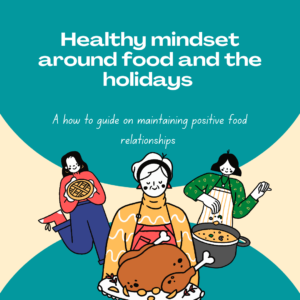Healthy Food Relationships in the Holiday Season

Winter is coming. The leaves are changing color, the sun is setting earlier, and the weather is supposed to be getting colder (you’re never really sure living in Texas). With this time of the year most of us have something in common to look forward to and that’s the festive holiday season. It seems that from the month of October to the end of December we here in the states are packed with some huge, demanding, and delicious traditions. Most of us look forward to the candy of Halloween, the cornucopia of food for Thanksgiving, the sweet warmth of gifts and hot chocolate around December, and finally the intense revelry and libations associated with new years. Food and drink take profound and intense significance during this time of the year! For many, this is a blessing and relief in the harsher cold and dark months. For those struggling with weight loss/maintenance or eating disorders, this can be an incredibly stressful and daunting time. Even those concerned with trying to maintain a relatively balanced diet might find themselves struggling to participate and indulge during the holidays. For those that struggle, there are a myriad of ways to circumvent the stress of holiday weight gain and over indulgence.
Hungry Holiday Hacks
Right off the bat, I know this is easier said than done, but enjoy yourself, it’s okay to indulge a little during this season! Remember as long as your diet remains in moderation, it can absolutely handle indulgences from time to time. We tend to enjoy life more when we do indulge in moderation! If you want to avoid overindulging though, here are some helpful guides to navigate the holiday hunger haze. (trigger warning for those with disordered eating, these suggestions are meant to be helpful, not harmful).
- Have a plan for how to approach your festive gatherings and stick to your normal eating habits
- Avoid standing next to the buffet table
- Go through all the food options first
- Don’t intentionally fast if not done regularly
- Seriously don’t starve yourself before an event!
- This will make you more likely to overeat
- It will also mess with your blood sugar
- Eating a snack high in fat and or using herbal bitters can help add some satiation beforehand and prepare the body for a large meal.
- Savor your food
- Take time to enjoy the food you or your loved ones have made(or purchased), your brain needs time to process how full your stomach actually is.
- If you’re concerned about not being able to try or eat everything, consider doing smaller portions of everything and truly savoring each and everything with patience, generosity, and gratitude.
- Load up on veggies first (salad greens are nature’s bitters and can help stimulate digestive enzymes necessary for proper assimilation of food)
- Do some physical activity
- Turkey trots, dancing, stretching, and walking help burn some additional calories, process our food, and relieve the stress some gatherings can induce
- Bring or make a more nutritionally balanced option
- We will provide a link to recipes you can try
- Have a glass of water in between drinks
- This will reduce your alcohol intake and also prevent potential hangovers
- Remember what the holidays are about
- Celebrating with loved ones and appreciating what we have!
A note for those with ED
It is highly recommended that those who have or are struggling with an eating disorder come up with a game plan for tackling the holidays and limiting exposure to potential triggers. Consulting with a trusted therapist, registered dietician, and your personal support network of friends, family, and trusted colleagues are crucial to giving you the support and space you need. Remember you are not alone and food is not your enemy. While eating disorders such as bulimia and anorexia nervosa are well studied and documented, there is a more recent eating disorder that has begun to show increasing prevalence and development as many people become preoccupied with having a healthy diet and lifestyle. The form of disordered eating known for having those afflicted with an unhealthy obsession for eating only “healthy” or “clean” foods is known as Orthorexia Nervosa, and is not included in the latest edition of the DSM (that will likely change with the next edition). Unlike other eating disorders where the quantity of food and calories are a chief concern, Individuals with orthorexia are concerned with the quality of the food they are putting in their bodies. While in theory this doesn’t sound like a bad thing to only want to put good things in your body, when it becomes a fixation and you start restricting and limiting foods from your diet that are actually beneficial for your overall physical and mental state and you notice a negative impact on your life, then this is a problem that bares consultation from a trained professional. Regardless, for anyone who wants to be more mindful of what they are putting in their body but still enjoy themselves for the holidays there are plenty of things you can do.
If you are interested in learning more about healthy relationships with food and would like one on one support, set up a free 15 minute discovery call or appointment with Dr. Nicole Shusterman, Dallas naturopathic doctor.
Helpful links
https://www.health.harvard.edu/blog/12-tips-for-holiday-eating-201212242506
https://www.cdc.gov/diabetes/library/features/holidays-healthy-eating.html
Eating Disorders and Holidays – Mirror-Mirror
https://www.webmd.com/mental-health/eating-disorders/what-is-orthorexia
